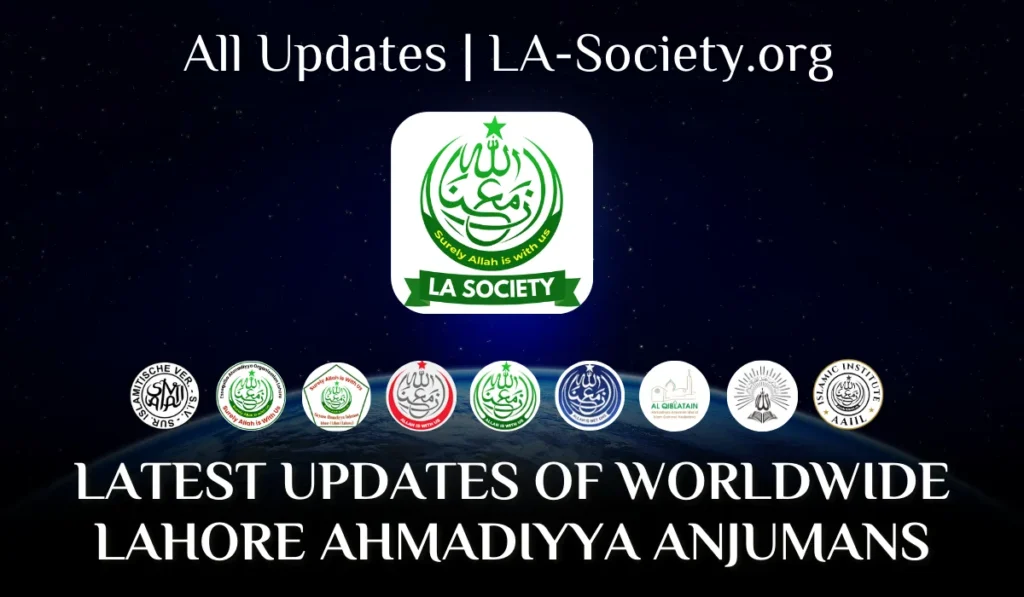Lahore Ahmadiyya Movement: Preserving the Authentic Message of Islam

The Lahore Ahmadiyya Movement represents a unique and impactful chapter in contemporary faith movements. Rooted in the original teachings of Islam and inspired by the reformist vision of Hazrat Mirza Ghulam Ahmad, the founder of the Ahmadiyya movement, the Lahore branch emerged with a calling to present Islam as a spiritual path grounded in peace and intellect.
Through its continuous scholarship, the Lahore Ahmadiyya Society promotes the essence of faith based on the Quran, Sunnah, and rational thought—bridging divisions and promoting mutual respect among people of all beliefs.
The Historical Foundation of the Ahmadiyya Faith
The Ahmadiyya Movement was founded in the late 19th century by Hazrat Mirza Ghulam Ahmad of Qadian, whose mission was to reawaken moral consciousness in Islam. His message emphasized that Islam stands for peace, logic, and love, aiming to reconcile religion with intellectual progress and social reform.
After his passing in 1908, the movement divided, leading to the formation of the Lahore Ahmadiyya Movement in 1914 under Maulana Muhammad Ali and Khwaja Kamal-ud-Din. This group upheld the original reformist ideals while focusing on rational interpretation and the peaceful propagation of its message through education and thought.
The Mission of the Lahore Ahmadiyya Movement
The Lahore Ahmadiyya Movement seeks to present Islam as a faith of peace and truth, not coercion. Its goals include restoring spiritual discipline among Muslims and encouraging believers to live with justice, humility, and compassion.
The movement emphasizes that Islam is in harmony with human intellect, bridging the gap between faith and reason. Through this balanced approach, it strives to restore moral and spiritual harmony worldwide.
Commitment to Scholarship and Translation
One of the Ahmadiyya Lahore Movement’s most celebrated achievements is its dedication to Islamic research and education. Under Maulana Muhammad Ali, the movement produced one of the earliest and most respected English translations of the Holy Quran—complete with commentary that bridges understanding between cultures.
Other notable works such as The Religion of Islam, The Living Thoughts of the Prophet Muhammad, and The Early Caliphate have introduced non-Muslim readers to Islam’s rational and humane side. Through its Lahore Ahmadiyya website and global publications, the society continues to provide free access to Quran translations, research papers, and Islamic literature for seekers of truth worldwide.
A Global Community Spreading Islam’s Peaceful Message
The Ahmadiyya Lahore community operates across continents, with branches in Europe, North America, Africa, and Asia. Through its Lahore Ahmadiyya Society centers, it promotes cross-cultural understanding, encouraging people of all faiths to explore Islam’s moral depth.
The official Lahore Ahmadiyya institutions worldwide act as lahore ahmadiyya society centers for study and humanitarian service. These efforts underline the community’s firm belief that Islam rejects extremism, values knowledge, and calls for unity and human progress.
Balancing Spiritual Faith and Rational Thought
What distinguishes the Lahore Ahmadiyya Movement is its balanced view of spirituality and logic. The movement teaches that Islam is both a religion of practice and understanding. It invites individuals to approach faith through knowledge and sincere inquiry.
Its teachings reaffirm that the Holy Prophet Muhammad (peace be upon him) was the final messenger and that the Quran remains the source of divine wisdom. By returning to these fundamentals, the movement works to remove sectarian divisions.
Publications and Online Outreach
Through its Lahore Ahmadiyya website and global networks, the movement has built a vast knowledge base of Islamic materials, including translated Quranic texts, biographies, scholarly essays, and educational programs. These resources cater to both students and truth-seekers.
This digital presence demonstrates its adaptability, helping people explore Islam’s universal moral principles and timeless message of peace.
Lahore Ahmadiyya Society – Promoting Unity and Education
The Lahore Ahmadiyya Society runs educational programs, libraries, and humanitarian projects that uplift communities through learning and compassion. Its goal is to cultivate both moral and intellectual excellence among individuals.
The society believes education is the foundation of peace. By empowering people with knowledge and values, it nurtures a generation inspired by the Islamic principles of justice, humility, and service.
The Official Lahore Ahmadiyya Presence Online
The official Lahore Ahmadiyya websites and digital platforms serve as authoritative resources for learning about the movement’s beliefs, history, and global projects. They ensure that Islam’s true interpretations are presented with authenticity and clarity.
These online resources also help promote interfaith understanding—reaffirming that Islam stands for compassion, knowledge, and freedom of belief.
Spreading the Message of Peace and Justice Through Islam
At its core, the Lahore Ahmadiyya Movement upholds Islam as a religion of balance and compassion. It teaches that true faith manifests through acts of kindness and truth.
The movement reminds believers that Islam’s message has always been one of wisdom, moderation, and mutual respect. Through this, it reinforces the timeless vision of Islam as a source of hope, understanding, and harmony for all.
Conclusion
The Lahore Ahmadiyya Movement continues to inspire Muslims and non-Muslims alike with its dedication to reform, education, and moral progress. Rooted in the principles of faith guided by reason, it remains a beacon of peaceful reform.
Through its Ahmadiyya Lahore website and international outreach, the movement carries forward its universal message—to spread peace, foster understanding, and guide humanity.